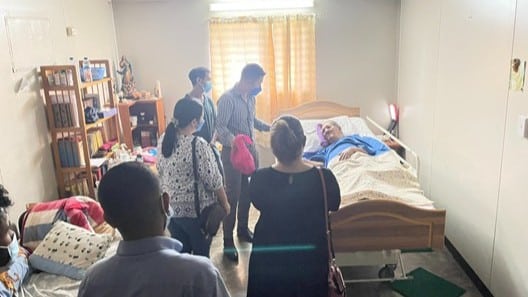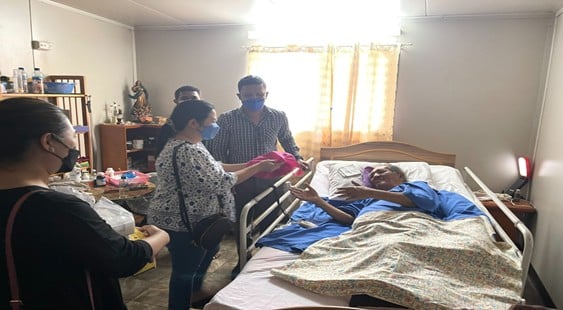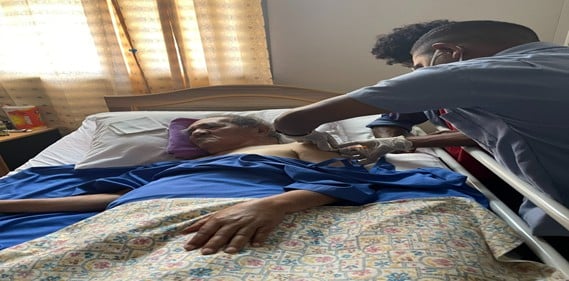Dr. Nilton Saturnino E. da Costa S. Cruz
Former Head of Department for Support and Coordination of Specialized Services, DNASH, Ministry of Health, Timor-Leste
Former Palliative Care Client Coordinator
General and Family Medicine Practitioner, Maliana Vila CHC
Lead Author, Timor-Leste National Palliative Care Guideline (2022)
Introduction
Timor-Leste, a young nation with a resilient spirit, has made significant strides in rebuilding its health system since regaining independence in 2002. Among many areas of development, palliative care has emerged as a critical yet under-resourced component of health service delivery. With limited formal services available, family and traditional caregivers have become the primary lifeline for patients facing life-limiting illness. This article reflects on Timor-Leste’s journey to build palliative care from the ground up — a journey rooted in kinship, community, and cultural wisdom.
The Need for Palliative Care in Timor-Leste
Timor-Leste is undergoing a rapid epidemiological transition. While communicable diseases and maternal-child health remain important priorities, the country is now facing an increasing burden of non-communicable diseases (NCDs), which accounted for approximately 44% of all deaths as of the most recent WHO estimates. These include cancer, cardiovascular disease, diabetes, stroke, and chronic respiratory illnesses — all of which can lead to prolonged suffering and require comprehensive, supportive care, particularly at advanced stages.
Unfortunately, the formal health system in Timor-Leste remains ill-equipped to respond to the complex, long-term needs of people living with life-limiting illness. Most patients with NCDs present late in the course of their illness, often because of poor health literacy, fear of diagnosis, limited transport to referral centers, or the cultural preference to seek traditional or faith-based treatment first. By the time they reach formal services, opportunities for curative interventions are often lost.
In this context, palliative care becomes essential — not only to alleviate physical symptoms like pain, breathlessness, and fatigue, but also to address psychological, social, and spiritual distress that patients and their families experience. However, access to palliative care services in Timor-Leste is currently extremely limited. Dedicated palliative care teams are only beginning to emerge, largely at the national level in Dili. Trained personnel remain few, and there is no national system yet to integrate palliative care into primary care or community outreach.
Furthermore, despite being listed on the WHO Model List of Essential Medicines, opioids such as morphine remain inaccessible to most people who need them. This is due to a combination of regulatory constraints, fear of misuse among prescribers, lack of education on opioid safety, and supply chain limitations. As a result, pain — one of the most feared and treatable symptoms — often goes unmanaged, leaving patients to suffer in silence.
The burden of care overwhelmingly falls on family members, particularly women, who provide physical, emotional, and spiritual support without training, supervision, or financial compensation. Most care is delivered in homes, where caregivers often lack the basic knowledge or equipment needed to provide comfort and dignity. In rural and remote areas — where over 70% of the population resides — geographic isolation further limits access to even the most basic health services, let alone specialized palliative care.
In this setting, developing a national palliative care system is not a luxury but a necessity. It must begin with scalable, community-based models, built around existing primary care networks, and reinforced by culturally appropriate training and policy. As Timor-Leste works toward universal health coverage, the inclusion of palliative care is both a moral imperative and a strategic investment in compassionate, cost-effective care.
Caring Beyond the Clinic
In Timor-Leste, family caregiving is a deeply embedded cultural norm and often the first and most enduring form of support for individuals facing serious illness. Families provide not only physical assistance but also emotional and spiritual care, acting as the foundation of compassion and continuity when formal services are limited.
Alongside family members, spiritual leaders and traditional caregivers play a vital role in holistic care. They offer culturally grounded support—through prayer, rituals, and traditional healing practices—that resonates deeply with patients and communities. Their presence reflects the communal values and spiritual strength that are central to the Timorese way of life.
Yet, these caregivers often operate without the training, resources, or formal support systems needed to sustain their roles. Many face emotional exhaustion, financial strain, and isolation, especially in rural or underserved areas.
Any future palliative care model in Timor-Leste must recognize and build upon these existing caregiving structures. Supporting family and traditional caregivers—through training, integration into care teams, and appropriate policy—will be critical to developing a system that is both effective and culturally respectful. By investing in those who care beyond the clinic, we honor local wisdom and strengthen the foundation of compassionate care in Timor-Leste.

Figure 1. Family members and palliative care providers visiting a patient at home in Timor-Leste, where care is deeply rooted in community and kinship.
National Progress
Recent milestones include the 2022 National Palliative Care Guideline, pilot units at HNGV and Lahane Hospital, and growing collaboration with the Catholic Church and local leaders. Efforts are underway to build integrated, culturally responsive systems and caregiver training.
Lessons and Regional Implications
The development of palliative care in Timor-Leste — while still in its early stages — offers valuable insights for other low-resource settings across the Asia Pacific. It underscores the importance of building care systems that are rooted in local context, responsive to cultural values, and realistic about health system limitations.
One of the most important lessons is that communities are not just beneficiaries — they are assets. In Timor-Leste, care has always been embedded in family, kinship, faith, and community obligations. These structures can and should form the foundation of care delivery, rather than being viewed as secondary or informal.
Key lessons that may benefit other countries in the region include:
1. Start with Existing Practices and Structures
Rather than replicating Western models, it is more sustainable to work with what already exists: families, traditional healers, local churches, and primary care clinics. These entities already provide much of the care and should be supported, trained, and integrated into the formal system.
2. Recognize and Support Caregivers as Part of the Health Workforce
Caregivers — especially women — often carry the physical and emotional burden of care at home without recognition or support. Training, respite services, psychosocial support, and public acknowledgment of their contributions are critical for sustainable palliative care.
3. Integrate Spiritual and Cultural Support as Core Components
In Timor-Leste, as in many parts of the Asia-Pacific region, spirituality plays a central role in how individuals and communities understand suffering, illness, and the process of dying. It is not simply a private matter, but a collective experience deeply intertwined with cultural identity and social relationships.
Incorporating spiritual leaders, traditional rituals, and long-held beliefs into care plans is essential for delivering care that is respectful, meaningful, and culturally appropriate. These elements foster trust between patients, families, and healthcare providers, creating a shared space where physical, emotional, and spiritual needs are addressed in harmony.
Recognizing and integrating these spiritual and cultural dimensions not only enriches the quality of care but also supports holistic wellbeing. It affirms patients’ dignity, offers comfort beyond clinical treatment, and strengthens community connections—ultimately contributing to more compassionate and effective palliative care in Timor-Leste.

Figure 2. Holistic care includes presence, conversation, and compassion — key elements of culturally appropriate palliative support in Timorese homes.
4. Prioritize Home-Based Care and Community Outreach
Hospital beds are limited and often not the preferred place of death. Most Timorese patients prefer to die at home, surrounded by loved ones. Community health workers and mobile palliative care teams are vital for reaching people where they are — particularly in rural or remote areas.

Figure 3. A health worker provides symptom management at the bedside — a growing but still rare service in Timor-Leste’s palliative care response.
5. Establish Functional Referral and Continuity Systems
Hospitals and health centers must be able to refer patients to community-based care — and vice versa — with clear protocols, communication tools, and shared responsibility for follow-up. Without this, patients fall through the cracks after discharge, and families are left unsupported.
These lessons are not unique to Timor-Leste. Across the Asia Pacific, many countries are grappling with the same questions: How do we deliver meaningful care with limited resources? How do we honor cultural values while building modern systems? The Timorese experience suggests that the answers lie in respecting existing caregiving traditions, investing in family and community, and ensuring that care is human, not just clinical.
As the region continues to advocate for universal health coverage, palliative care must be recognized not as a luxury, but as a human right — one that is achievable even in the most resource-constrained settings when we lead with empathy and cultural insight.
Conclusion
Timor-Leste’s journey reflects a broader truth for the Asia Pacific region: sustainable palliative care must be culturally grounded and community-led. By recognizing and strengthening family and traditional caregivers, we honor both clinical best practices and deeply rooted values of care.
References
- World Health Organization. (2021). Palliative Care. https://www.who.int/news-room/fact-sheets/detail/palliative-care
- Knaul, F. M., Farmer, P. E., Krakauer, E. L., et al. (2018). Alleviating the access abyss in palliative care and pain relief—an imperative of universal health coverage. The Lancet, 391(10128), 1391–1454.
- Asia Pacific Hospice Palliative Care Network. (2023). Regional Updates. https://aphn.org
- Ministry of Health Timor-Leste. (2022). National Palliative Care Guideline.
- Sleeman, K. E., de Brito, M., Etkind, S., et al. (2019). The escalating global burden of serious health-related suffering: projections to 2060. The Lancet Global Health, 7(7), e883–e892.
- Gomes, B., Calanzani, N., Gysels, M., Hall, S., & Higginson, I. J. (2013). Heterogeneity and changes in preferences for dying at home: a systematic review. BMC Palliative Care, 12(1), 7.
